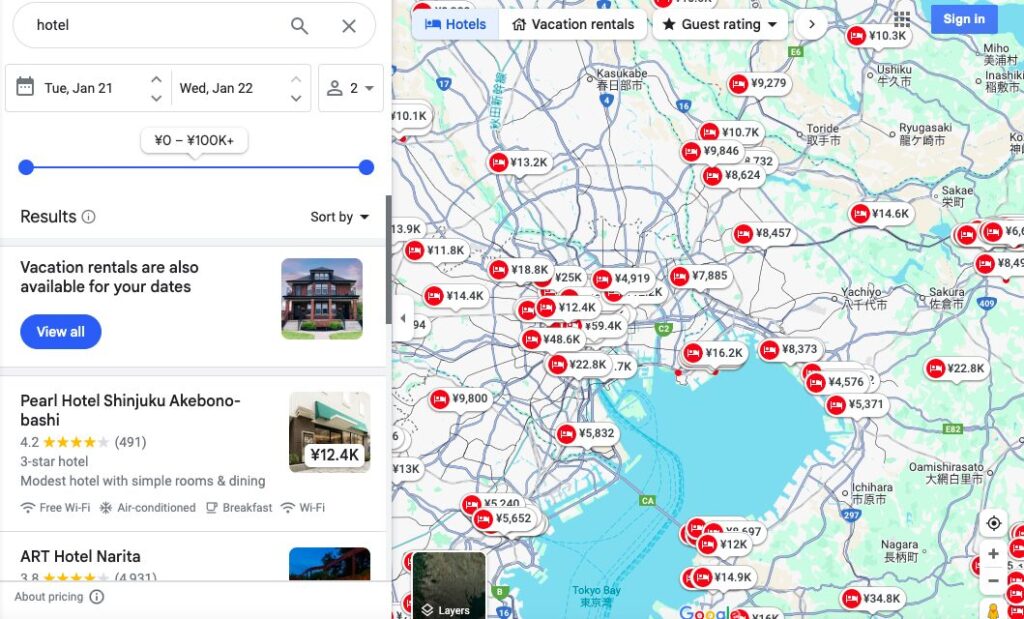Contents
- Hotel Type
- Rules
- 1. Check-in and Check-out Times
- 2. Shoes Off Indoors
- 3. Tatami Rooms
- 4. Quiet and Respectful Behavior
- 5. Onsen (Hot Spring Baths) Etiquette
- 6. Quiet Hours
- 7. Room Keys
- 8. Meals
- 9. Tipping
- 10. Smoking Policies
- 11. Bringing Outside Food
- 12. Noise from Room Devices
- 13. Additional Charges
- 14. Safety and Security
- 15. Language Barrier
- 16. Environmental Practices
- How to find a nice Hotels
Hotel Type
Japan offers a wide variety of hotel types, catering to different tastes, budgets, and travel experiences. Whether you're looking for luxury, tradition, or a modern, minimalist vibe, there's something for everyone. Here are some of the main types of hotels you can find in Japan.
1. 旅館 Ryokan (Traditional Japanese Inn)
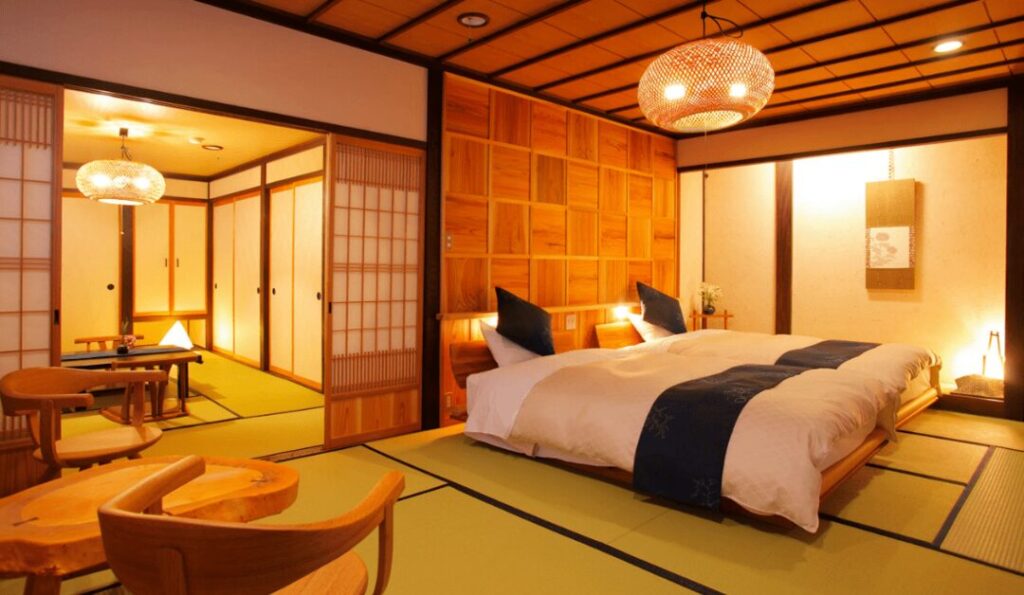
- Description: A ryokan is a traditional Japanese inn, typically found in hot spring (onsen) resorts or scenic areas. Staying at a ryokan offers a glimpse into Japan's cultural heritage. Rooms often feature tatami mats, futons (Japanese bedding), and sliding paper doors (shoji).
- Experience: Guests typically wear yukata (a casual kimono), and meals (often multi-course kaiseki) are usually served in the room or a communal dining area. Many ryokans offer access to onsen (hot spring baths).
- Famous Areas: Hakone, Kyoto, Ibusuki, and Gifu are known for their ryokan experiences.
- Price: 44USD~ / 7000円〜
2. ビジネスホテル Business Hotels
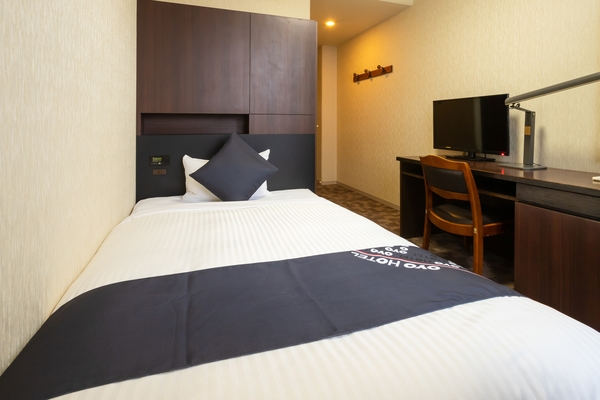
- Description: These are affordable hotels designed for business travelers, but they’re great for tourists as well. Rooms are compact, often featuring basic amenities like a bed, desk, and shower. Business hotels are found in major cities across Japan.
- Experience: While the rooms are typically small, these hotels are convenient, clean, and efficient. Many also offer breakfast buffets or vending machines with snacks and drinks.
- Famous Areas: Tokyo, Osaka, Fukuoka, Sapporo, and other major urban centers.
- Famous Business Hotels
- Prise: 39USD~ / 6000円〜
3. カプセルホテル Capsule Hotels
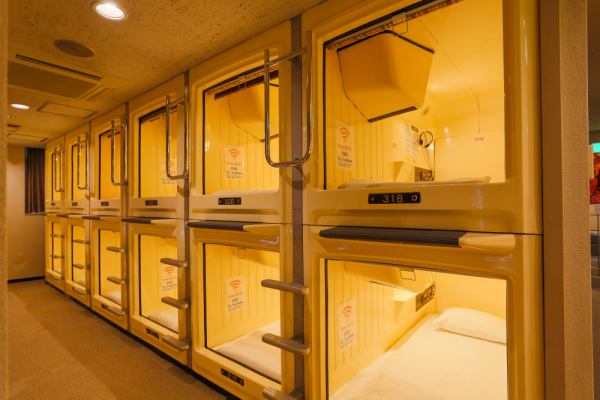
- Description: These ultra-modern, minimalist hotels are unique to Japan. Guests sleep in small, pod-like capsules stacked side by side. While space is limited, the facilities typically include shared bathrooms, lounges, and sometimes, entertainment options.
- Experience: Capsule hotels are an inexpensive, quirky, and fun way to stay in cities. They’re most popular among solo travelers, particularly in urban hubs.
- Famous Areas: Tokyo (especially in Shinjuku), Osaka, and other large cities.
- Price: 19USD~ / 3000円〜
4. 高級ホテル Luxury Hotels
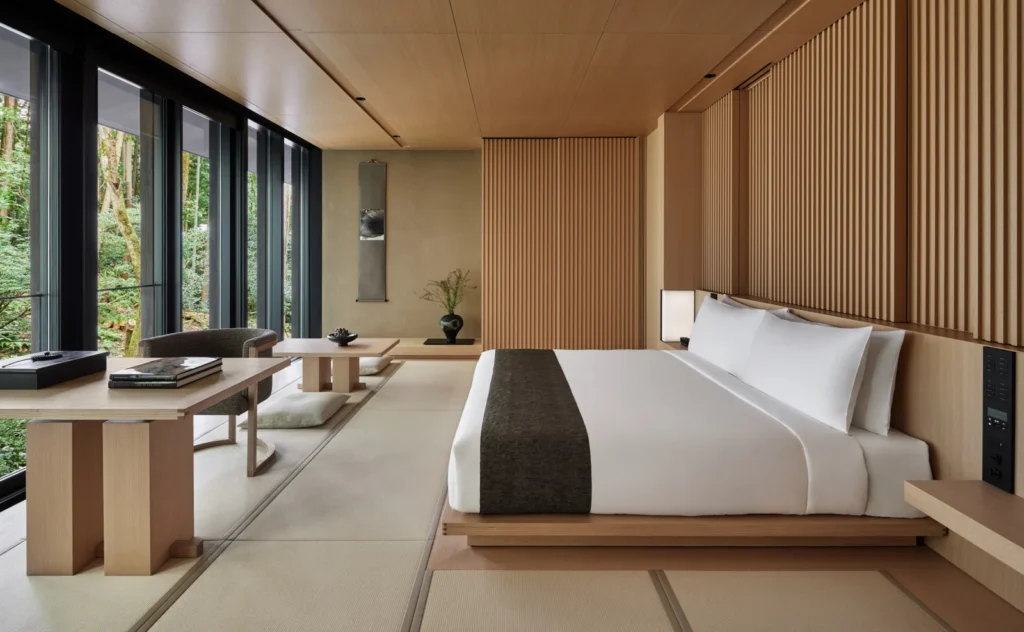
- Description: Japan has a range of luxury hotels that offer world-class service, state-of-the-art amenities, and exceptional views. International brands like the Ritz-Carlton, Mandarin Oriental, and Four Seasons have properties here, alongside high-end Japanese chains such as the Aman and The Peninsula.
- Experience: These hotels often feature opulent decor, gourmet dining options, spas, and wellness facilities. Many offer exceptional views, especially in Tokyo and Kyoto, where cityscapes or temples can be enjoyed from the rooms.
- Famous Areas: Tokyo, Kyoto, Osaka, Hokkaido, Okinawa.
- Famous Luxury Hotels
- Price: 64USD~ / 10000円〜
5. ラブホテル Love Hotels
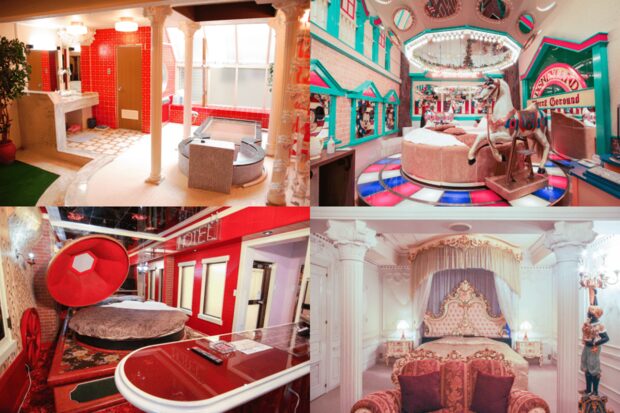
- Description: Love hotels are designed for couples seeking privacy and discretion. These hotels often offer themed rooms and flexible check-in/out times, catering to short stays.
- Experience: Rooms often have luxurious or quirky decor, and some come with features like large bathtubs, karaoke machines, or even video game consoles.
- Famous Areas: Tokyo’s Shibuya, Shinjuku, and other entertainment districts.
- Price: 50USD~ / 8000円〜
6. ホステル Hostels
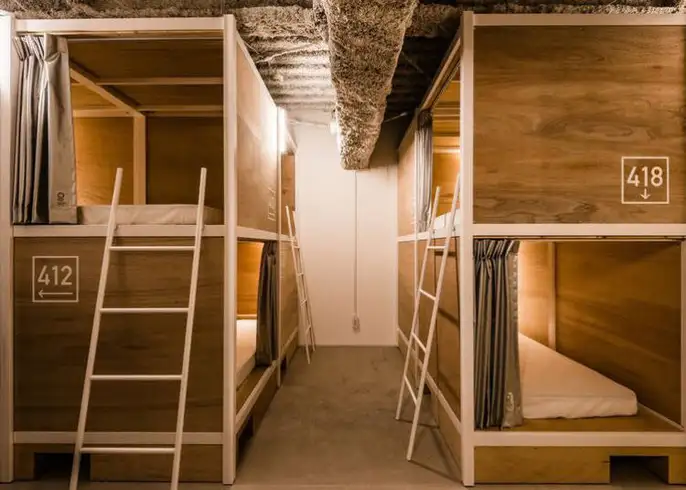
- Description: A more affordable option, hostels are popular with budget travelers and backpackers. Japanese hostels tend to be clean, well-maintained, and offer both dormitory-style and private rooms.
- Experience: You can expect common spaces to meet fellow travelers, sometimes with kitchens, lounges, or even bike rentals. Some hostels also host cultural events or tours.
- Famous Areas: Tokyo, Osaka, Kyoto, Nara, and other touristy cities.
- Price: 13USD~ / 2000円〜
7. 民宿 Minshuku
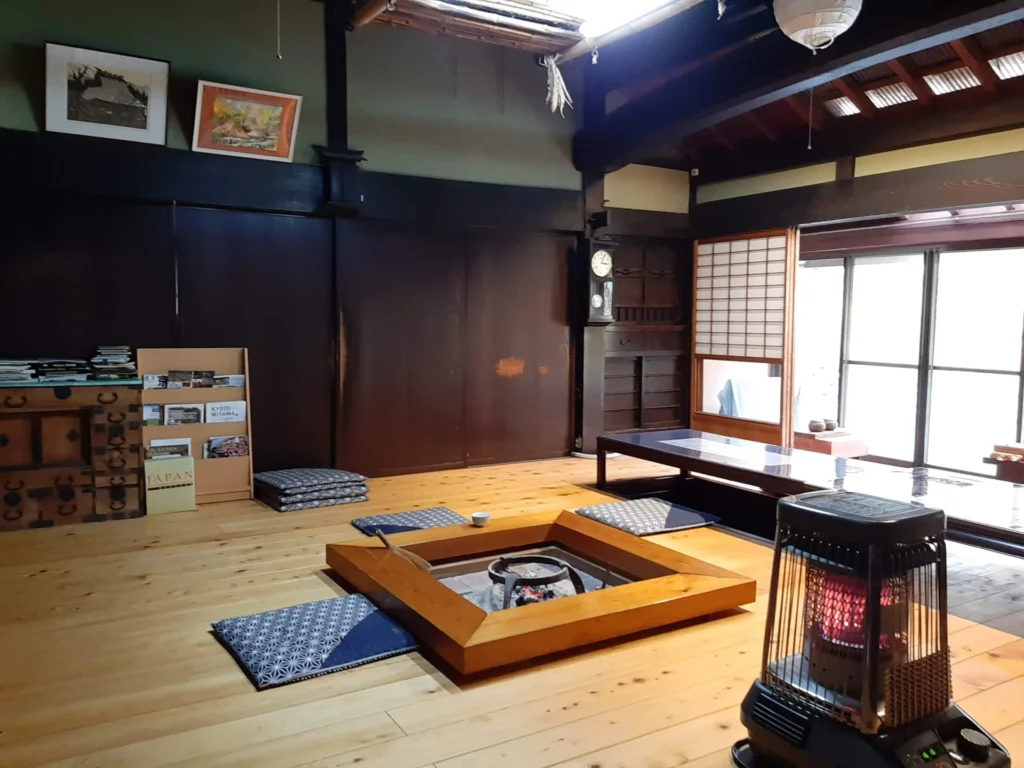
- Description: A minshuku is a family-operated guesthouse, offering an authentic, homely experience. Similar to ryokan but generally more affordable, these are great for experiencing local life.
- Experience: Rooms are typically simple with tatami mats, and meals (often home-cooked) are included. Staying in a minshuku gives you a chance to connect with the family that runs the place.
- Famous Areas: Rural Japan, on the way to scenic areas, and near cultural sites.
- Price: 19USD~ / 3000円〜
8.温泉付きホテル Onsen Hotels
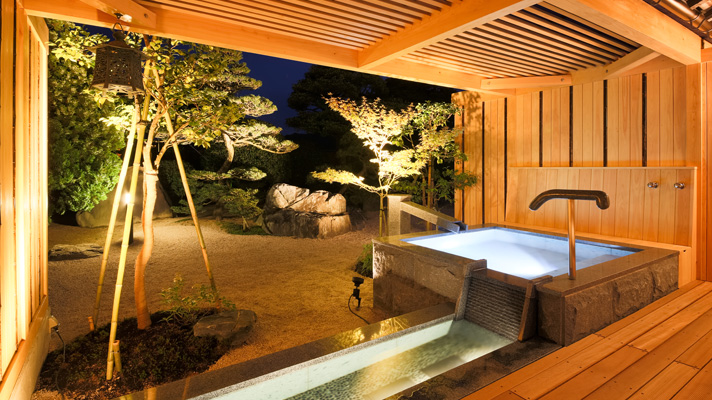
- Description: These are resorts or hotels built around natural hot spring baths. Many are located in regions famous for their onsen culture. Guests can enjoy the therapeutic benefits of soaking in mineral-rich hot springs.
- Experience: You can often find indoor and outdoor baths (rotenburo), spa treatments, and traditional Japanese meals, all in a tranquil environment.
- Famous Areas: Hakone, Beppu, Ibusuki, Gero, and Kusatsu.
- Price: 63USD~ / 10000円〜
9. 宿坊 Shukubou (Temple Lodging)
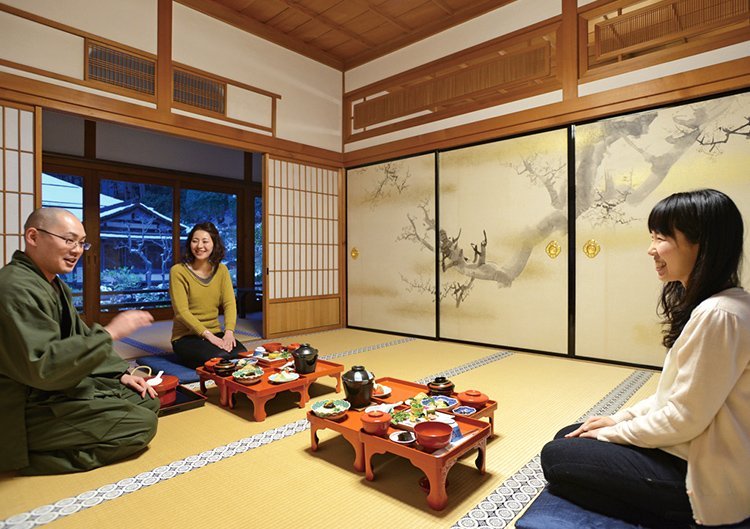
- Description: Some Buddhist temples in Japan offer overnight stays, allowing guests to experience monastic life. This is a unique, spiritual experience where guests stay in the temple's guest rooms, eat vegetarian meals, and sometimes participate in meditation.
- Experience: This is a more tranquil and immersive way to experience Japanese culture and spirituality. Visitors are encouraged to maintain silence, and the stay is often quite austere.
- Famous Areas: Mount Koya, Kyoto, and other pilgrimage routes.
- Website: https://terahaku.jp/about/
- Price: 70USD~ / 11000円〜
Things to Know
- Tatami Rooms: If you stay in a ryokan, minshuku, or even some business hotels, expect to find rooms with tatami (woven straw) flooring. It's traditional to take off your shoes when entering a room with tatami mats.
- Check-in and Check-out Times: In Japan, typical check-in times are around 3:00 PM, and check-out is around 11:00 AM. Be sure to confirm this with your hotel when booking.
- Language: While many hotel staff in major tourist destinations speak English, it’s still a good idea to know a few key phrases or carry a translation app for smoother communication in more remote areas.
Rules
Japanese hotels, or ryokan (traditional inns), business hotels, and international hotels, have specific rules and customs that might differ from those in other countries. Here are some general rules and practices to be aware of:
1. Check-in and Check-out Times
- Check-in: Usually between 3:00 PM and 6:00 PM.
- Check-out: Typically by 10:00 AM or 11:00 AM.
- Some hotels may allow early check-in or late check-out for an extra charge or based on availability.
2. Shoes Off Indoors
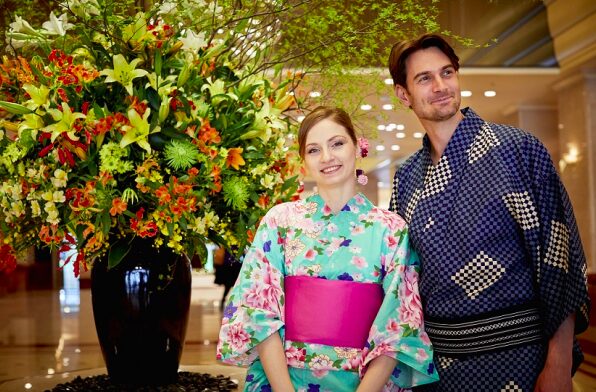
- Shoes are not allowed indoors in many places, especially in traditional ryokan, guesthouses, or tatami rooms.
- You may be provided with indoor slippers or yukata (robes) to wear inside.
3. Tatami Rooms

- In ryokan or traditional inns, rooms often feature tatami mats, which are a type of woven straw flooring.
- Tatami etiquette: Don’t sit or sleep on the tatami with shoes or socks on.
- Guests are usually provided with a futon mattress for sleeping, which is rolled out at night by the hotel staff or set up by the guest themselves.
4. Quiet and Respectful Behavior
- Japanese hotels expect guests to be quiet and respectful of others' privacy.
- No loud talking or disturbing others, particularly in shared spaces like hallways and communal areas.
5. Onsen (Hot Spring Baths) Etiquette
- Many hotels, particularly ryokan and resorts, have onsen (hot springs) or communal baths.
- Shower first: Before entering the public bath, you must thoroughly clean and rinse your body in the provided shower stations.
- No towels in the bath: You can bring a small towel to the bath area, but you should leave it outside the actual bathing area. Don’t bring the towel into the water.
- No loud talking or splashing in the onsen to maintain a tranquil atmosphere.
6. Quiet Hours
- Many hotels have quiet hours after a certain time (usually after 10:00 PM). This applies to both indoor and outdoor areas, including balconies or gardens. Guests are expected to keep noise to a minimum.
7. Room Keys
- Some traditional hotels may require guests to leave their room key at the front desk when leaving the hotel. This is especially common in ryokan.
8. Meals
- Ryokan often offer kaiseki (multi-course meals), which can be served in your room or in a dining area.
- Breakfast and dinner times are usually fixed, and it’s recommended to arrive on time.
9. Tipping
- Tipping is not customary in Japan, and it could even be considered rude or confusing. Instead, good service is a standard expectation, and staff members will often bow and thank you for your business.
10. Smoking Policies
- Many hotels have specific smoking rooms or designated smoking areas.
- Smoking in rooms or non-designated areas is typically prohibited in most hotels, especially in more upscale establishments.
11. Bringing Outside Food
- Bringing outside food into your room may be discouraged in some hotels, particularly ryokan or higher-end hotels. If you're unsure, ask the staff.
12. Noise from Room Devices
- Be mindful of air conditioners, TVs, and other noisy devices in your room. If you need to make adjustments, do so quietly to avoid disturbing others.
13. Additional Charges
- Minibar: Some hotels, especially international ones, may have an in-room minibar. Items consumed from it may incur extra charges.
- Extra amenities: Charges may apply for additional services, such as additional towels, pillows, or late check-out.
14. Safety and Security
- Locking doors: Most hotels provide safety features like room safes. Be sure to lock your door whenever you leave the room.
- Some hotels offer shared rooms, particularly in hostels, so locking your valuables away in a safe is recommended.
15. Language Barrier
- While many hotels in Japan have English-speaking staff, it’s a good idea to learn a few basic Japanese phrases or carry a translation app, especially in smaller, local establishments.
16. Environmental Practices
- Japanese hotels often encourage environmental conservation, such as reusing towels, reducing electricity consumption, and conserving water.
- It’s common for guests to be asked to place used towels on a rack if they plan to reuse them.
By following these basic rules and showing respect for the local customs, you'll have a smooth and enjoyable stay at any Japanese hotel.
How to find a nice Hotels
1.Open Google Map

2.Enter "Hotel"
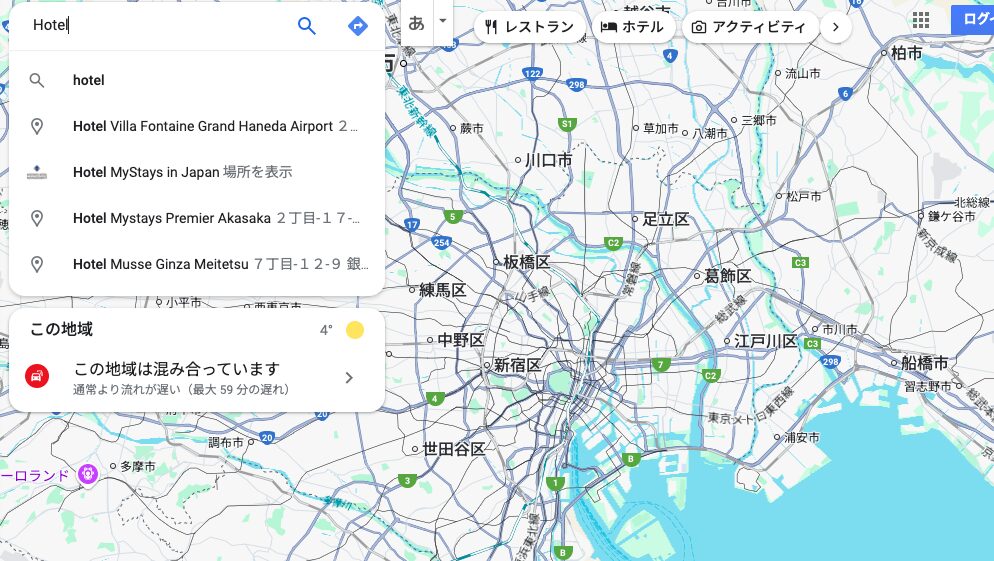
3. Select Dates, Guests, Price
